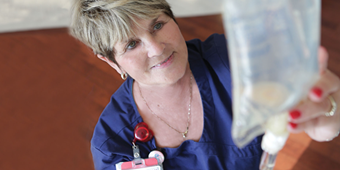- Breast Cancer
- Breast Cancer and Genetic Counseling
- Cancer
- Cancer Information for Women
- Cancer Prevention
- Gynecologic Cancer
- Health Topics
When BRCA Genes Make Trouble

Answer a few questions and we'll provide you with a list of primary care providers that best fit your needs.
Let’s face it. Many risk factors exist for breast cancer. Some you can’t change – like your age or race. Others you can, especially if they’re lifestyle choices like smoking, drinking, and diet. Inheriting certain genes can also raise your risk, but you can take steps to manage that. The most common cause of hereditary breast cancer is an inherited mutation in the BRCA1 or BRCA2 gene.
What Role Do BRCA Genes Play In Breast Cancer?
When they function properly, BRCA1 and BRCA2 genes work to suppress the development of breast cancer, says breast surgeon Thomas Heck, MD. But, if they are mutated or broken, the risk of developing breast cancer is increased.
Dr. Heck explains the BRCA1 and BRCA2 genes.
Click play to watch the video or read video transcript.
You can inherit a harmful BRCA1 or BRCA2 mutation from your mother or father. If this is the case, your lifetime risk of developing breast and/or ovarian cancer rises greatly.
How Can I Find Out If I Carry These Genes?
Genetic testing can tell you if you are a carrier for mutations in either BRCA gene. Dr. Heck explains that cancer specialists use such genetic tests in patients who meet the criteria for testing, not as a screening tool.
Dr. Heck explains how women can determine if they carry a BRCA gene mutation.
Click play to watch the video or read video transcript.
Genetic testing examines your DNA – usually from a blood or saliva sample. If you’re considering genetic testing, talk first with a doctor, nurse or genetic counselor who is qualified to explain the pros and cons of testing and to interpret the results.
Harmful BRCA1 and BRCA2 gene mutations are rare.
Keep in mind that harmful BRCA1 and BRCA2 gene mutations are rare. Most experts agree that if you don’t have cancer, you should only be tested if your individual or family history indicates a possible problem. Only a small fraction of women who have a family history of breast cancer should be referred for genetic counseling and testing.
I Have a Harmful BRCA Gene. Now What?
If you know that you carry a harmful BRCA1 or BRCA2 mutation and want to manage your cancer risk, consider these options in consultation with your physician:
- Enhanced screening. You could start cancer screenings at a younger age than is typical or get screened more often. Some experts recommend annual clinical breast exams and mammograms before the age of 40.
- Genetic testing. Be sure to discuss your situation with a breast specialist or genetic counselor. They can identify and explain the incidence of certain kinds of cancer for you and your family, and present options for general cancer prevention and medical watchfulness. If further testing is necessary, a certified genetic counselor can explain the advantages, disadvantages, and limitations of genetic test results.
- Preventive (prophylactic) mastectomies. Removing both breasts before cancer is diagnosed can greatly reduce the risk of breast cancer – by up to 97 percent, according to the American Cancer Society. Some women who have cancer diagnosed in one breast decide to remove the other healthy breast to help prevent a second breast cancer. Removing the ovaries also reduces the risk of breast cancer in premenopausal women by eliminating a source of hormones that can fuel the growth of some breast cancers.
- Chemoprevention. Using drugs to reduce the risk of cancer is also showing some promise. Tamoxifen and raloxifene can be used by some women to block the action of estrogen in breast tissue. Experts recommend that these drugs only be used by women who know they are at risk of breast cancer.
Answer a few questions and we'll provide you with a list of primary care providers that best fit your needs.
Source: National Cancer Institute; American Cancer Society; Thomas Heck, MD, Gem City Surgeons







